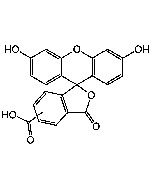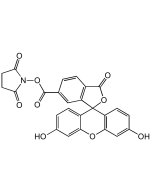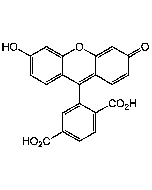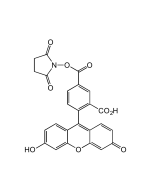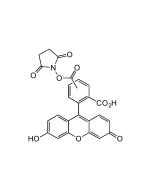Cookie Policy: This site uses cookies to improve your experience. You can find out more about our use of cookies in our Privacy Policy. By continuing to browse this site you agree to our use of cookies.
Chemodex
5-FAM

| Product Details | |
|---|---|
| Synonyms | 5-Carboxyfluorescein |
| Product Type | Chemical |
| Properties | |
| Formula |
C21H12O7 |
| MW | 376.32 |
| CAS | 76823-03-5 |
| Source/Host Chemicals | Synthetic. |
| Purity Chemicals | ≥95% (HPLC) |
| Appearance | Yellow-orange solid. |
| Solubility | Soluble in water, DMSO or DMF. |
| Identity | Determined by 1H-NMR. |
| Declaration | Manufactured by Chemodex. |
| Other Product Data |
Click here for Original Manufacturer Product Datasheet |
| InChi Key | VPMWLNJETPKSSC-UHFFFAOYSA-N |
| Smiles | OC(=O)C1=CC=C(C(=C1)C(O)=O)C1=C2C=CC(=O)C=C2OC2=CC(O)=CC=C12 |
| Shipping and Handling | |
| Shipping | AMBIENT |
| Short Term Storage | +4°C |
| Long Term Storage | +4°C |
| Handling Advice | Protect from light and moisture. |
| Use/Stability | Stable for at least 2 years after receipt when stored at +4°C. |
| Documents | |
| MSDS |
 Download PDF Download PDF |
| Product Specification Sheet | |
| Datasheet |
 Download PDF Download PDF |
5-FAM is the amine-reactive purified single isomer of 5,6-carboxyfluorescein and is used for labeling peptides, proteins and nucleotides through the interaction of carboxylic acid with primary amines. It has been used to develop a variety of green fluorescent reagents and small fluorescent molecules due to its relatively high absorbance characteristics, excellent fluorescence quantum yield, and good water solubility. The probe has also found application in studies of liposome-cell, cell-cell, and liposome-liposome interactions and in related studies on lipid bilayer structures. Spectral data: λex = 494nm; λem = 518nm. Carboxyfluorescein is better retained in cells than is fluorescein, its pKa of ~6.5 is lower than the cytosolic pH of most cells (pH ~6.8-7.4). Carboxyfluorescein is commonly employed as a polar tracer.
(1) E. Ralston, et al.; Biochim. Biophys. Acta. Biomembr. 649, 133 (1981) | (2) R. Fischer, et al.; Bioconj. Chem. 14, 653 (2003) | (3) M. Tokmina-Roszyk, et al.; Biopolymers 100, 347 (2013) | (4) V.A. Povedailo, et al.; J. Fluoresc. 30, 629 (2020) | (5) L. Cheng, et al.; Front. Bioeng. Biotechnol. 11, 1310258 (2023)





